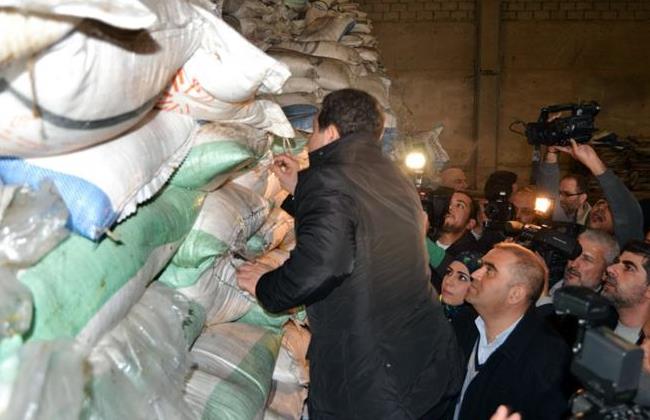Corruption In Lebanon: ‘It’s like opening Pandora’s box’
Jan. 06, 2015
Venetia Rainey/The Daily Star
BEIRUT: The recent burst of revelations about the level of corruption and mismanagement in Lebanon, from radioactive goods at the airport to moldy labneh, can be classified as news only in its details – the broad shape of the situation has been known for years. So what’s going on?
Monday saw several ministers issue forceful, even combative statements over the performance of their respective ministries.
Environment Minister Mohammad Machnouk called out “some people” for demanding that the Naameh landfill be closed, citing the lack of an alternative, putting himself up against Progressive Socialist Party leader Walid Jumblatt and his Agriculture Minister Akram Chehayeb and their insistence that the dump be shut down after 17 long, smelly years.
Elsewhere, Health Minister Wael Abu Faour and Economy and Trade Minister Alain Hakim traded blows over the former’s ongoing and highly controversial food safety crusade, which over the last week has zeroed in on ministerial control of sales of sugar and grain in the country.
Also Monday, Finance Minister Ali Hasan Khalil revealed that dangerous radioactive parts had been found in industrial and kitchen items recently seized at Beirut’s port and international airport, vowing to hold importers accountable.
But none of these will truly come as a surprise to anyone who is used to the way Lebanon works, so why the sudden, very public blame game between established ministers who have seen it all before?
“I think it’s politically driven, I don’t think these ministers are sincere,” said Hilal Khashan, professor of political sciences at the American University of Beirut. “Politics is stagnant and these people want to maintain a place in the sun of Lebanese politics.”
“They are trying to make waves, these will not amount to much.”
He pointed to the hypocrisies within the stances of the various ministers, arguing that their campaigns to expose wrongdoing were unlikely to last long. He argued, for example, that Abu Faour’s campaign to name and shame restaurants lacked transparency.
“[Abu Faour] never told us about the specifications that he was using for the violations, which in any case have been going on for years and years. I’m surprised that he has just discovered it recently.” He also suggested that Abu Faour was attempting to divert attention from less savory rumors doing the rounds in Lebanon.
“Meanwhile, Khalil is talking about the radioactive things coming into Lebanon,” Khashan continued. “He comes from the group of [Speaker Nabih] Berri, who openly admits that he is corrupt and works only for the interests of the country’s Shiites. Now one of his men is coming out and talking about public safety, I wouldn’t take it too seriously.”
This view was echoed by Imad Salamey, a political science professor at the Lebanese American University, who said that such ministers taking a vocal and aggressive approach to longtime, institutional issues was highly problematic.
“What is interesting is that the health minister has overtaken the rule of other political entities, so instead of acting as an executive he is acting as a watchdog, releasing himself from the responsibilities of an executive branch minister,” Salamey said.
“The executive branch which Abu Faour represents should not be taking on such a role; they should be the ones to be accountable. If all these things are true, then he should resign,” he said. He also pointed to the dangerous precedent being set by such public accusations and actions.
“If a minister unleashed a campaign exposing things that he believes are in the public interest, then he could start a ministers’ war that could undermine the whole government,” Salamey said. “These things should be discussed by the Council of Ministers in order to keep everything functioning properly. It should not be done in the press,” he said.
But not everyone agrees, and for Yahya Hakim, the director general of the Lebanese Transparency Association, such open discussion of the crippling, endemic problems facing Lebanon is long overdue.
“The simple idea of opening the subject is excellent,” he said. “People never thought of the magnitude of these problems – the accumulation of years and years of neglect, carelessness and laissez faire – until somebody bursts the bubble.”
“The problem is that it’s like opening Pandora’s Box: if they want to change things, then the whole system needs to change. It can’t be done by simply sending a few inspectors to a factory or warehouse.”

















